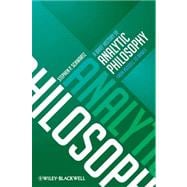
| Preface | p. xi |
| Introduction: What is Analytic Philosophy? | p. 1 |
| Leading Analytic Philosophers | p. 6 |
| Russell and Moore | p. 8 |
| Empiricism, Mathematics, and Symbolic Logic | p. 8 |
| Logicism | p. 12 |
| Russell on Definite Descriptions | p. 20 |
| G. E. Moore's Philosophy of Common Sense | p. 27 |
| Moore and Russell on Sense Data | p. 30 |
| Moore's and Russell's Anti-Hegelianism | p. 33 |
| Summary | p. 38 |
| Wittgenstein, the Vienna Circle, and Logical Positivism | p. 46 |
| Introduction | p. 46 |
| Ludwig Wittgenstein and the Tractatus Logico-Philosophicus | p. 48 |
| Historical Note: The Vienna Circle and their Allies | p. 58 |
| The Elimination of Metaphysics and the Logical Positivist Program | p. 59 |
| The Demise of the Vienna Circle | p. 68 |
| The Influence of the Logical Positivists | p. 69 |
| Responses to Logical Positivism: Quine, Kuhn, and American Pragmatism | p. 76 |
| Introduction | p. 76 |
| The Demise of the Verifiability Criterion of Meaningfulness | p. 78 |
| Quine's Rejection of the Analytic/Synthetic Distinction | p. 82 |
| Quinean Empiricism without the Dogmas | p. 86 |
| American Pragmatists after Quine: Nelson Goodman, Richard Rorty, and Hilary Putnam | p. 101 |
| Oxford Ordinary Language Philosophy and Later Wittgenstein | p. 119 |
| Introduction | p. 119 |
| The Attack on Formalism - Strawson and Ryle | p. 124 |
| Philosophy of Language - Austin and Wittgenstein | p. 128 |
| Philosophy of Mind - Ryle, Strawson, and Wittgenstein | p. 138 |
| The Rejection of Sense Data Theory | p. 147 |
| The Legacy of Ordinary Language Philosophy | p. 153 |
| Responses to Ordinary Language Philosophy: Logic, Language, and Mind | p. 160 |
| Formal Logic and Philosophy of Language | p. 161 |
| Gödel and Tarski | p. 161 |
| Davidson | p. 166 |
| Grice | p. 174 |
| Carnap - Meaning and Necessity | p. 178 |
| Chomsky | p. 180 |
| Philosophy of Mind | p. 183 |
| Functionalism | p. 183 |
| Objections to Functionalism - Bats and the Chinese Room | p. 188 |
| Anomalous Monism | p. 192 |
| The Problem of Mental Causation | p. 194 |
| The Rebirth of Metaphysics | p. 204 |
| Modal Logic | p. 204 |
| Possible Worlds | p. 212 |
| Problems with the Canonical Conception of Possible Worlds | p. 216 |
| Transworld Identity and Identification | p. 223 |
| The Modal Version of the Ontological Argument | p. 229 |
| Naming, Necessity, and Natural Kinds: Kripke, Putnam, and Donnellan | p. 239 |
| Introduction | p. 239 |
| The Traditional Theory of Meaning and Reference | p. 240 |
| Kripke's and Donnellan's Criticism of the Traditional Theory: Names and Descriptions | p. 243 |
| Natural Kind Terms | p. 247 |
| Problems for the New Theory of Reference | p. 253 |
| Applications of the New Theory of Reference to the Philosophy of Mind | p. 257 |
| The Social, Cultural, and Institutional Basis of Meaning and Reference | p. 260 |
| Ethics and Metaethics in the Analytic Tradition | p. 264 |
| Introduction | p. 264 |
| G. E. Moore's Principia Ethica | p. 266 |
| The Non-Cognitivism of C. L. Stevenson | p. 269 |
| The Universal Prescriptivism of R. M. Hare | p. 272 |
| The Return to Substantive Ethics | p. 275 |
| Questioning the Fact/Value Divide | p. 278 |
| Peter Singer and Animal Liberation | p. 281 |
| John Rawls' Theory of Justice | p. 285 |
| Epilogue: Analytic Philosophy Today and Tomorrow | p. 299 |
| Analytic Philosophy since 1980 | p. 299 |
| What is the Future of Analytic Philosophy? | p. 321 |
| References | p. 327 |
| Index | p. 337 |
| Table of Contents provided by Publisher. All Rights Reserved. |
The New copy of this book will include any supplemental materials advertised. Please check the title of the book to determine if it should include any access cards, study guides, lab manuals, CDs, etc.
The Used, Rental and eBook copies of this book are not guaranteed to include any supplemental materials. Typically, only the book itself is included. This is true even if the title states it includes any access cards, study guides, lab manuals, CDs, etc.